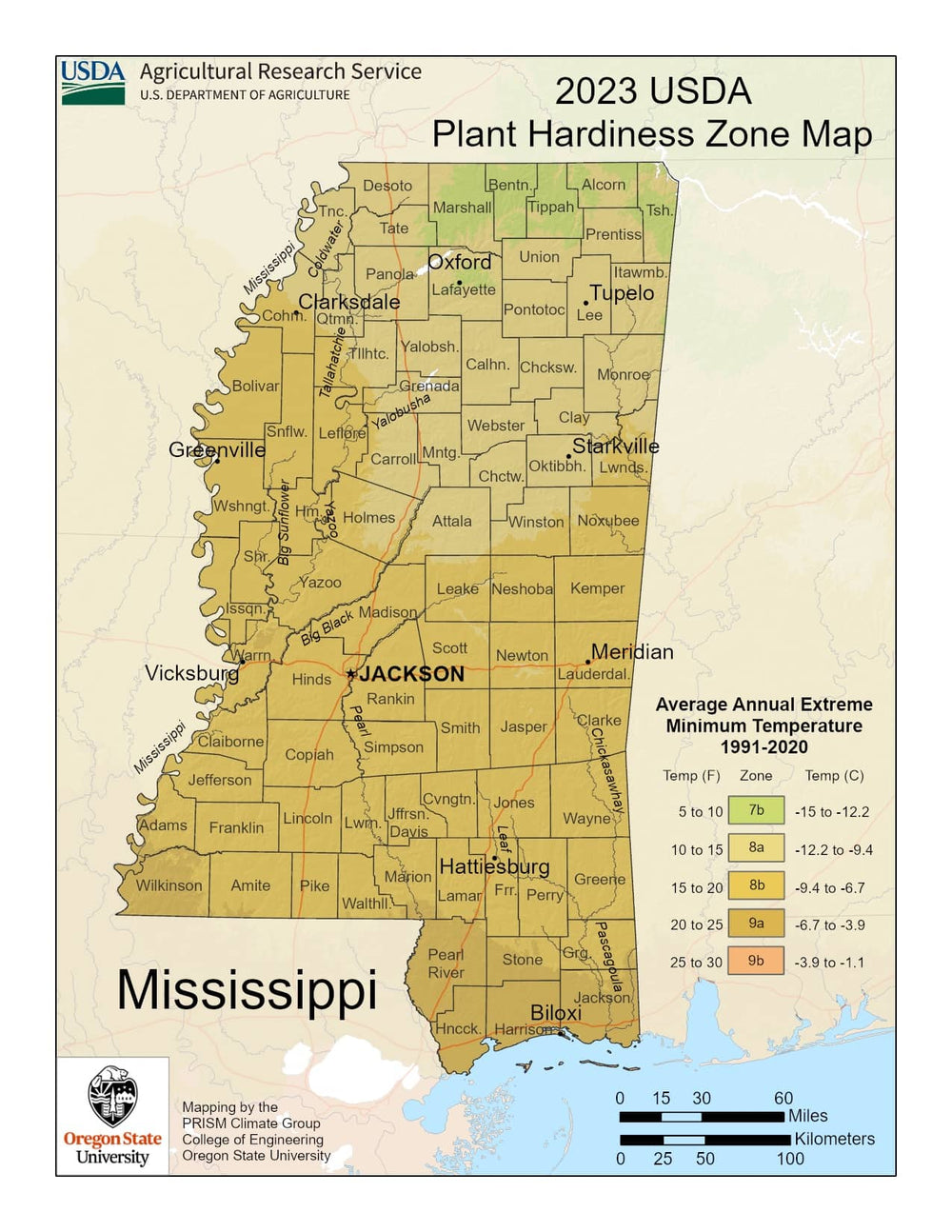Image from USDA
Characteristics of Mississippi’s Planting Region
Mississippi has a humid subtropical climate, defined by long, hot summers, mild winters, and abundant rainfall year-round. Its proximity to the Gulf of Mexico influences the state’s weather patterns, leading to a longer-than-average growing season and fewer temperature extremes than interior states.
What to expect as a Mississippi gardener:
- Summer highs range from 88°F to 92°F (31°C to 33°C)
- Winter lows typically stay above 30°F (-1°C) in the southern zones, and rarely drop below 20°F (-6°C) even in the northern areas
- Annual rainfall of 50–65 inches (127–165 cm), with most precipitation occurring in late winter and spring
- Growing season: typically 240 to 300 days, with the longest seasons along the Gulf Coast
- Soil types vary widely, from loamy Delta soils in the west to sandy coastal soils in the south and clay-rich soils in the northeast
With this long season and ample rain, Mississippi is one of the most versatile states for gardeners.

Challenges of Growing in Mississippi
High Humidity & Heat
Excessive moisture and high temperatures can promote fungal diseases such as powdery mildew, blight, and root rot. Many plants struggle without proper airflow or shade.
Heavy Rainfall & Poor Drainage
Some regions suffer from overly saturated soils, especially clay-heavy areas. Raised beds and proper drainage are important to prevent root diseases and waterlogged crops.
Pests
Mississippi’s warmth is great for plants—but also for insects. Common garden pests include: aphids, tomato hornworms, squash bugs, fire ants, and whiteflies. Organic pest control methods and crop rotation are essential here.

The Benefits of Using a Greenhouse in Mississippi
A greenhouse isn’t just for northern climates—it can be a game-changer in the Deep South, too.
1. Extend Your Growing Season
- Without a Greenhouse: Summer heat can overwhelm tender crops, and spring rains can rot early seedlings. Outdoor planting typically begins in early March and ends in late November in southern Mississippi.
- With a Greenhouse: You can ventilate, shade, and control watering to create the perfect environment, even in July. Start seedlings as early as January and grow cool-season crops well into December.
Learn more about your area's specific growing dates and the best vegetables to plant in each part of Mississippi.

Customer images of their Greenhouse setup in the region
2. Grow a Wider Variety of Vegetables Without a Greenhouse:
- Without a Greenhouse:
Mississippi’s climate supports a wide range of outdoor crops:
|
Tomatoes Peppers Corn Potatoes Muscadines |
Squash Melons Okra Green beans Peaches |
- With a Greenhouse:
But with a greenhouse, you can grow:
|
Lettuce Spinach Kale Arugula Swiss chard Broccoli Cauliflower Peas |
Brussels sprouts Cabbage Carrots Radishes Beets Turnips Celery Cucumber |
Bell peppers Eggplant Figs Green beans Asparagus Artichokes Kohlrabi Melons |

